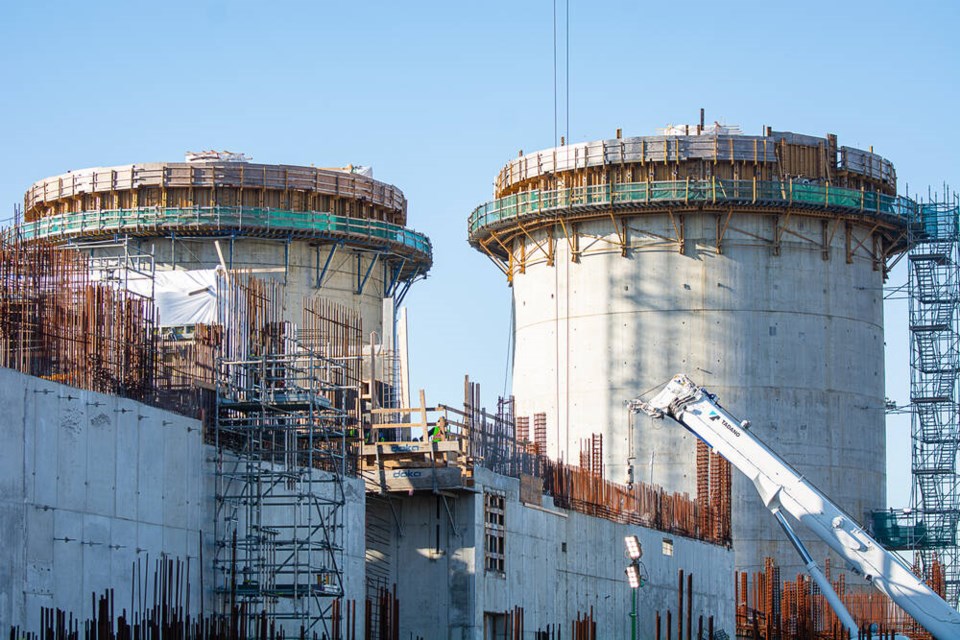A B.C. Supreme Court judge has decided that the former contractor for the North Shore Wastewater Treatment Plant project does not have to cut from its list of nearly four million documents produced in a legal battle with Metro Vancouver.
In April, Metro had sought a court order that would force Acciona Wastewater Solutions to remove any "irrelevant and duplicate documents" and provide a declaration of the newly amended list.
But in his July 7 ruling, Justice Bruce Elwood found that Acciona had made reasonable efforts to ensure the documents filed in the case were relevant, and that it had not merely done a “document dump” – a tactic used to purposely complicate legal proceedings.
This is the latest in a complex lawsuit between Metro and Acciona over the design, construction and partial financing of the sewage plant.
Acciona is suing Metro for more than $250 million for breaches of contractual obligations, including wrongfully terminating the project agreement.
Metro is countersuing Acciona and six affiliates for more than $1 billion for breaching the agreement, including “material” breaches.
In October 2021, Metro terminated the project agreement with Acciona, and PCL Construction was hired as the new construction manager in 2022. The estimated cost of the project has ballooned from $700 million to almost $4 billion.
In May of this year, Metro applied to delay the upcoming trial, which is currently scheduled for March 1, 2027, citing the document load as a major impediment to being ready for trial. Elwood denied that request as well.
Metro accuses Acciona of 'document dump' tactic
In the more recent matter, Metro argued that the magnitude of irrelevant and duplicate documents amounted to an unlawful document dump to complicate the process of sharing documents with Metro’s lawyers. Metro alleged that Acciona had not done enough manual human review while producing documents for trial.
But Acciona strongly disputed that claim, stating that it took all reasonable steps to minimize the number of irrelevant or duplicate documents.
In total, Acciona collected almost 29 million documents for trial, including roughly 20 million emails and attachments, five million documents from an internal share drive, and two million from the project management software that Acciona used to communicate with Metro and other participants during the design and construction phases of the project, according to Elwood’s written ruling.
Acciona then used specialized software to reduce the number irrelevant documents.
The judge disagreed with Metro’s claim that the document list was inaccurate. Elwood noted that Acciona manually reviewed nearly half a million documents that the software was unable to, and that the company's other quality controls and had removed nearly 150,000 irrelevant documents over the past year.
“While there are unquestionably a large number of irrelevant documents in Acciona’s production, there are not as many as [Metro] claims. Moreover, it is not fair to say, as [Metro] does, that Acciona knowingly produced some 750,000 irrelevant documents,” Elwood said.
He described a document dump as an “abusive, old-school practice” where a party discloses a large number of irrelevant and disorganized documents to inflict costs and confusion on the receiving party.
“I would not describe Acciona’s conduct as a document dump,” he said.
Elwood said he agreed with Metro that producing documents shouldn’t add undue burden in reviewing irrelevant or duplicate ones.
“However, the standard is not perfection. The courts recognize that 100 per cent accuracy in electronic discovery is impractical,” he said.
In denying Metro’s request, the judge also ordered the regional government to cover Acciona’s costs related to the application. But the judge denied Acciona's request for additional special costs, and said Metro's application was "neither frivolous nor wasteful."
[email protected]
twitter.com/nick_laba
@nicklaba.bsky.social
 Want to stay updated on North Vancouver and West Vancouver news? Sign up for our free daily newsletter.
Want to stay updated on North Vancouver and West Vancouver news? Sign up for our free daily newsletter.




